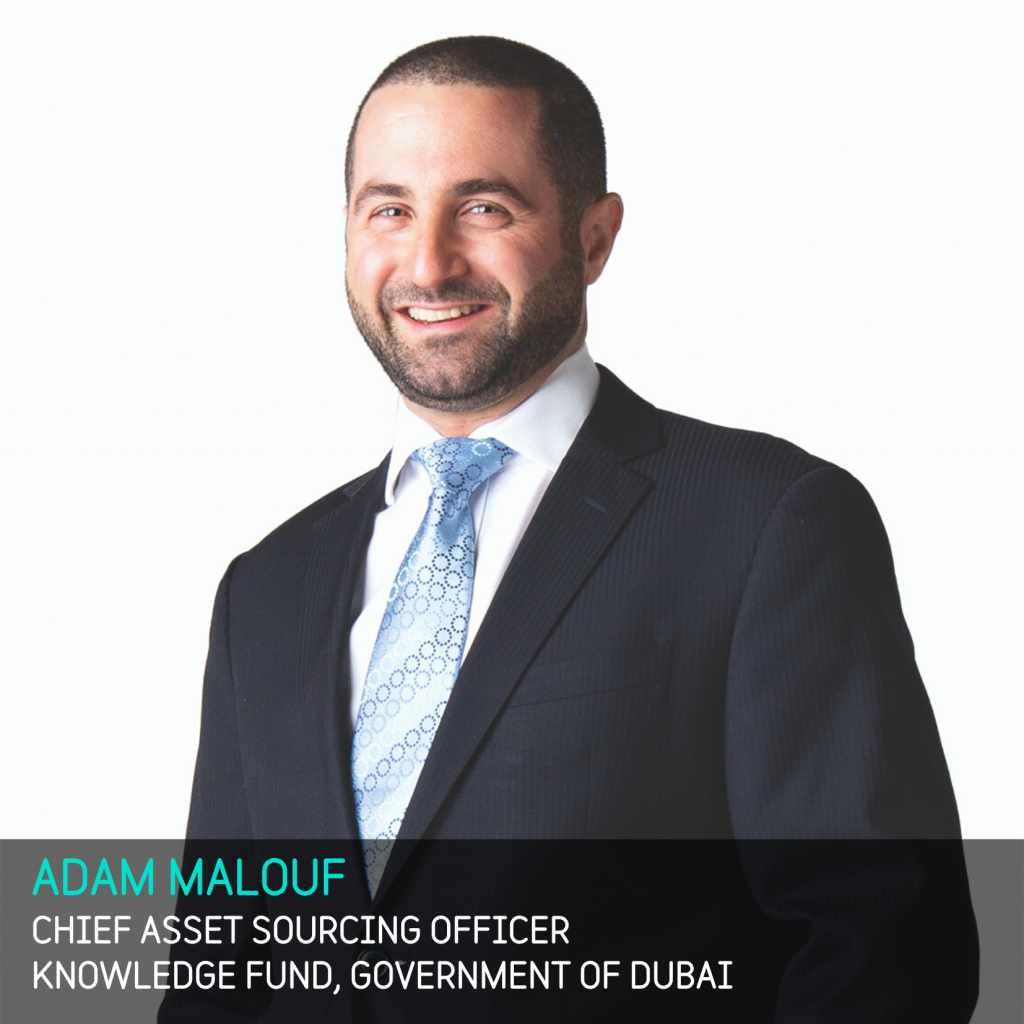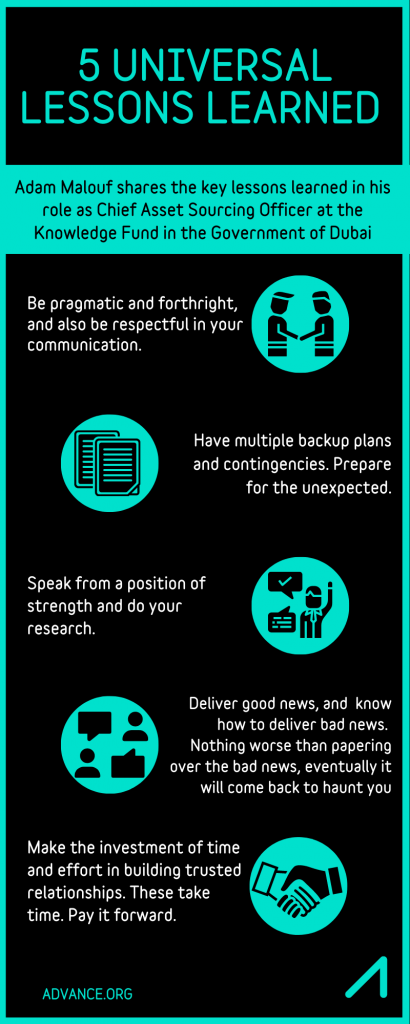WATCH > Adam Malouf in conversation with Maria MacNamara

Adam Malouf is the Chief Asset Sourcing Officer at the Knowledge Fund in the Government of Dubai. He is also Chair of the Middle East Advisory Committee at the Australian Institute of Company Directors and a Board Member for Trade and Investment at the Australian Business Council Dubai. Adam has been living in the UAE for 16 years now, and sees the country as a very open environment that welcomes business.
Helping to build resilient leadership
Adam heads up investments for one of the Dubai Government’s sovereign wealth funds. The aim, like many sovereign wealth funds, is to diversify deployment of liquidity to generate sustainable returns. He observes: “We have historically focussed on education and also real estate, and we are always looking at other asset classes and sectors.
“So when you talk about education, you are looking not only at education in terms of early learning, K-12 and higher education, but you are talking more broadly. It is what I call knowledge propagation: building the leaders of tomorrow to be more resilient. Particularly in these very challenging times, that is becoming more and more important”
Adam explains that the transformation of the education system in Dubai began in 2010 when the government created the system from scratch taking into consideration all cultural needs, learning styles and price points. Today, Dubai has one of the most unique private education systems in the world, with 300,000 students in over 200 schools, with many curricula and pedagogies available. Facilities are generally very good in terms of physical infrastructure, and they are distributed both geographically and demographically. This means everyone generally has access to a school that meets their budget and other requirements within 15-20 minutes of where they live.
Opportunities for Australians in the UAE
Adam has actively maintained a relationship with Australia, trying to find areas of common interest between Australia, the UAE, and the Middle East -particularly the Gulf Region he reflects: “I think that most Australians have a very straight forward and candid attitude.
Whether it is in social circles or in business, people like to know upfront the way you are thinking -that is critical. In the UAE and in this region, there cannot be hidden agendas, they need pragmatic solutions to problems. And that is how Australians can add value to everyday life here.”
There are about 15,000 Australians living in the UAE and around 300 Australian companies with a presence in the country. The Australian community has a very strong unity of purpose and is very close knit, with people willing to help each other both socially and professionally.
There is a willingness to work with other expat communities, and with relevant local and federal government entities. Adam thinks that in the medium to long term there are several areas where Australian companies are already making a difference in the UAE.
Opportunity knocks
Technology underpins everything that is done in a country subscribed to the fourth industrial revolution as a pillar of its growth for the next 50 years. Any technology that can make processes, procedures and systems more efficient and effective, and reduce cost, is welcomed.
Adam says: “When you look at financial services, funds management is something that Australia does really well. We have among the largest pools of super money in the world, with the rigour in governance, risk and compliance for the survival and growth of that type of business. If you look at healthcare, Australia has very good facility and patient management systems, and also medical research capabilities. Another area is education, particularly vocational education and training, corporate training, and research capabilities that come out of Australian universities. And then transport -Australia is very good at complex infrastructure. Partnerships here I think would be welcomed.”
Sovereign funds are another opportunity from which Australia can benefit. There have been past initiatives in the UAE where Australia benefited. There is once again a chance to partner with investors in the UAE who know their target markets and take a long term view.
Adam adds: “They are well oiled machines, they have very good boards and executive teams, and sharp analysts who have worked in some of the largest investment banks and financial institutions around the world. They have what I call a patient capital approach. But also, they can move quickly if they have to. That’s the advantage. Regardless of what sector, what industry, there will always be an opportunity to partner in that regard. Regardless of your risk status, and of the stage you are at in terms of growth.”
Innovation and investments in the UAE
Adam mentions that the current pandemic has increased the universe of opportunities available in the UAE for Australian high growth companies. He suggests that the best way to go about raising funds for startups and scaleups is through a joint venture or a public-private partnership. The critical step is choosing the right partner from government, private companies, or a group of private individuals.
Event though the pool of VC funding is not as big as other parts of the world, the government has a mandate to invest money and has set up its funds arms as specific VC entities. “In terms of raising funds, there are three discrete pools of funding: Sovereign funds, family offices, and venture capital funds. Each of those has its own risk appetite and parameters in terms of timing, asset allocation, and sector exposure requirements. Sovereigns traditionally focus on income generation, because they have a long term view.
Family offices could be a bit more nimble in terms of getting things done because there is less bureaucracy. VCs are growing rapidly in this part of the world, and there has been a number of funding grounds for some well known companies in the region.”
Invest in the relationship not just the transaction

An important part of the investment process builds on trust, relationships, and rapport. Adam says that as Australia has well tuned areas of expertise, a key part would be the way in which that expertise is communicated. “Anyone who has a transactional mindset here doesn’t get very far. It’s about being collaborative, about taking it slowly.
You want to develop a partnership that is based on mutual trust and respect. What is important to recognise is that the region is not homogenous, even for countries that are all part of the Gulf Cooperation Council states. You have to study the requirements and needs of each market” says Adam.
There is a fair bit happening in terms of corporate innovation as investors in the UAE. A number of accelerators are supported by the government and semi government authorities. There are innovation funds linked to the government which provide funding for startups and for pre Series A and Series A funding rounds.
Adam mentions a number of areas of opportunity for Australians seeking investment funds including: agriculture, innovation, education, financial services and tourism in the UAE
“That ecosystem exists here, and within some of the financial free zones they have regulatory sandboxes where companies can set up with low touch regulation and relative freedom to try new ideas and concepts…so there are means by which companies can actually raise money, and also have the rigor of governance and regulation come in at the same time as they are raising money. Those two tracks ideally move concurrently as they grow, and eventually they can look at a larger, viable exit, by way of an IPO or a trade sale” says Adam.
Expo 2020 has been postponed to October 2021 due to the COVID-19 crisis. Adam sees this as an opportunity for Australian companies, particularly on those that focus on mobility and sustainability.
He believes the extra time gives companies the chance to refine their offering for the global market : “Something that has a good online presence, and that they can actually implement and follow up in terms of their offering remotely. That is what would actually speak volumes here. It engenders efficiency, cost effectiveness, and it really demonstrates a model that is relatively resilient should something like this happen again, or another external shock for that matter. I think that this time now is actually going to be used quite effectively.”
Governance rules
Adam chairs the Middle East Advisory Committee for the Australian Institute of Company Directors. On the issue of governance, he explains that our very good friends at the AICD aim to foster the fundamental principles of operation of boards that can be universally applied, by taking into account the local context in terms of relevance and cultural appropriateness.
He says: “We try to promote that governance is contextual. It has to be adapted to suit different types of entities. There is no one size fits all. So whether you are talking about a government entity, a private company, a family office, you need to shape and mould the governance and board operation structures to fit that.”
When it comes to board dynamics, Adam looks at exerting hard and soft influence in the boardroom, at the appropriate time. In the Middle East generally it is about building trust and rapport amongst the board over time, understanding the context and that boardroom dynamics can be different than in other parts of the world.
Lesson plans
Adam also observes that there are several areas that Australia can learn from the way business is done well in the UAE such as in:
- Agricultural technologies, due to the arid and dry climate, the challenges are similar in terms of food security, land and water management.
- AI and its industrial applications could be relevant for Australia. The UAE has a dedicated ministry for AI, which highlights how the country has embraced the fourth industrial revolution as a key part of its development.
- Smart government initiatives, such as promoting operational efficiencies through e-government, and moving government services online as much as possible. The Dubai government aims to be paperless by 2021 and they are on track to achieve this.
Further information
RESOURCES
- Dubai Future Foundation is looking at AI development as an increasingly important player
- Mohammed bin Rashid Innovation Fund and Dubai SME, entities that have an important role in the future strategy and the growth of Dubai
ABOUT
Adam has 20 years of experience as a C-suite executive and non executive director, and has worked in multiple roles and industries. With a high degree of cross border experience and cultural awareness, he has been focussed on finance, management, strategy and governance. His degrees in commerce and law at UNSW allowed him to work in private legal practice, focusing on banking and finance, real estate, funds management, private equity and capital markets. His journey as a global Australian started around 2004, when Dubai came onto his radar. He recognises that what keeps him overseas is the ‘can do’ attitude and growth aspirations of the UAE. After sixteen years, he still finds Dubai a place that encourages and creates the environment which enables free trade, low cost of doing business, sensible regulation and open dealings between government, private sector, business associations and other entities in the corporate ecosystem.
CAREER SNAPSHOT
- Chief Asset Sourcing Officer at the Knowledge Fund in the Government of Dubai,
- Chair of the Middle East Advisory Committee at the Australian Institute of Company Directors
- Board Member for Trade and Investment at the Australian Business Council Dubai
- On the management committee and is a strategic advisor for the NSW chapter of The Australia Arab Chamber of Commerce and Industry
- Independent Non Executive Member of the Board Finance and Risk Management Committee for the Royal Australasian College of Physicians
join advance.org
Membership is free